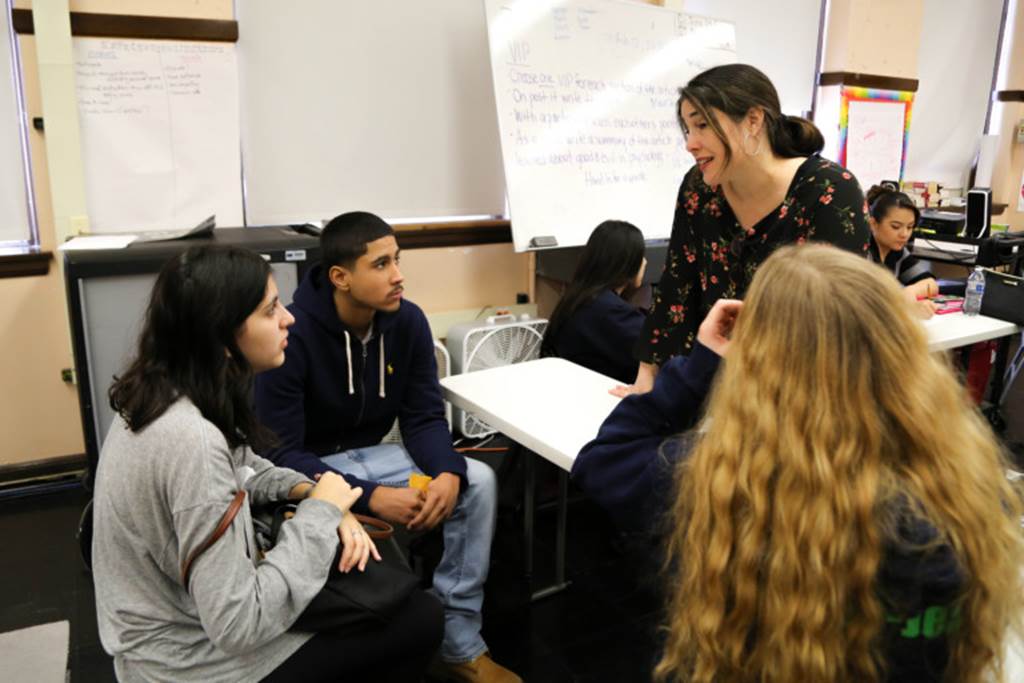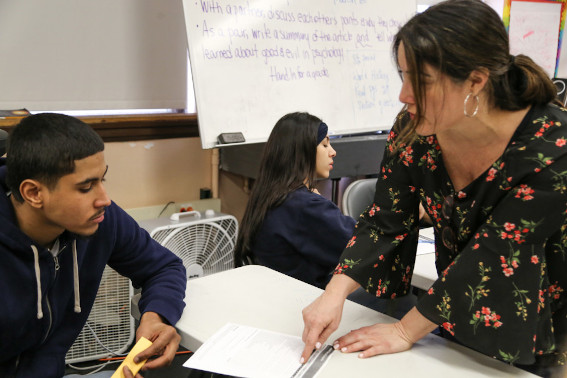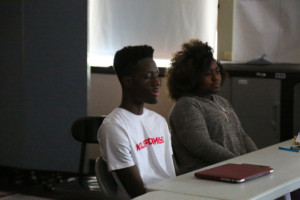New Peer Conferencing Class Teaches How to Resolve Conflict
15 February 2018
The Peer Conferencing class has been equipping students with the skills to help others resolve conflict without adults having to step in.

“We’re not supposed to have the answer,” says Lake View High School senior Dante Martin.
“We’re here to talk to you, have you vent to us. We’re just here to support them and help them come up with their own ideas.”
Martin is a student in his school’s new Peer Conferencing class. He was explaining how his role is about helping students who need a good listener, as well as someone to help them figure out how they can resolve their conflicts.
For his classmate Skylar Robertson, so far patience has been her takeaway, since the class launched at the beginning of the school year.
She described a situation where a student wouldn’t open up and was very reluctant to try her peer conferencing group’s suggestion.
“I needed to keep myself calm and collected, instead of getting agitated and having an attitude,” she said.
Students like 17-year-old Miguel Agyei said the class has been preparing him for college and beyond.
“I think the skills that we learn here will be valuable for us in college because we won’t have our parents there to save us,” he said. “We’ll have to communicate and advocate for ourselves.”
PEER CONFERENCING
The Peer Conferencing class meets five days a week and is taught by psychology teacher Anna Marie Proni, who has been a teacher at the school for 15 years.
The class has been equipping students with the skills to help others resolve conflict without adults having to step in, said the school’s assistant principal Meghan Sovell.
The class was adapted from a program that was introduced during the 2016-2017 academic year. It was a collaborative effort between Sovell, a former social work intern from the University of Chicago, and a dean.
Proni was approached by both Sovell and the dean, asking her if she would be willing to run the program.
Support for training came from CPS’ Office of Social Emotional Learning.
It did well, Proni said, but she wanted to see something more structured for the next year, which is why the program turned into a daily class.
“We needed structure, we needed to say this is happening third period,” she said. “We needed to be visible.”
Sovell said that she did her research and couldn’t find any school in the country following the model she helped create. Turning the program into a class has been beneficial for the school as a whole, she said.
“A lot of research on restorative justice shows that students listen to students,” she said. “There are times when the deans are really great at their job, but there are times where the kids just aren’t listening. In that case the move to peer counseling could be really powerful for them.”
HOW IT WORKS
This year, Proni’s class has 22 students, comprised of juniors and seniors. Many of the seniors participated in the program last year. To join the new class, students must be nominated by teachers. They submit a list of names.
Proni bases her curriculum around the Illinois Social and Emotional Learning Standards. So teaching students how to develop self-awareness and self management skills so they are successful in both school and their personal life is important, she said. Also, getting them to analyze how their thoughts and emotions affect decision making and behavior is another topic the class addresses, she said.
When students make bad choices or display inappropriate behavior, the school’s deans decide if the situation is one they need to handle or if it can be passed off to the Peer Conference groups to work through. The student always has the option to participate in the peer conferencing or let a dean discipline them, Proni said.
The latter isn’t always the right fit for each student, which is why it’s best to have options, she added.
So far the class has had less than five cases this school year, but the students said they’ve been learning a lot already.
THE IMPACT
Many students just want to feel like someone is truly listening, said student Dimitri Karambinis.
“This is about opening up and having your voice heard,” he said. “I think a lot of issues evolve from bottling it up for so long.
“Everybody benefits from this healing circle,” Dimitri added. “We all pour our heart out and relate to each other about problems at home or even at school.”
They even add a few minutes at the end of the period to meditate. It helps them clear their mind and shake loose all of the stress, Proni said.
The entire class agreed that their Peer Conferencing class is a great addition to the school.
“Kids are able to really focus and not feel judged because usually when there’s an adult or authority figure you may feel like you’re being looked down upon,” said Lirio Romero.
Principal Paul Karafiol said that he believes the class is “incredibly empowering” for students and he’s glad it’s offered.
“The real benefit of this are the skills they’re learning,” he said.
Related Stories
16 May 2025
Get to Know an Outstanding Eighth-Grader at Neil Elementary
Terrence is known for his poise, leadership, intelligence, and dedication.
15 May 2025
Spotlighting an Awesome Soon-to-Be Graduate at Lara Academy
Ismael is known for his hard work, openness, and ability to achieve whatever he sets his mind to!
14 May 2025
Meet a Terrific Member of the Libby Elementary School Class of 2025
Fabian has impressed many of the adults at his school with his perseverance, positivity, and strong academic performance.
14 May 2025
Getting to Know an Exceptional Eighth-Grade Student from Albany Park Multicultural Academy
Ailin has left a positive mark on her school that her peers and teachers alike have noticed.






